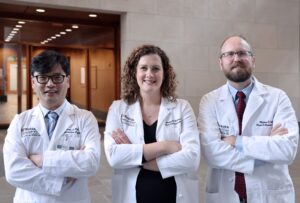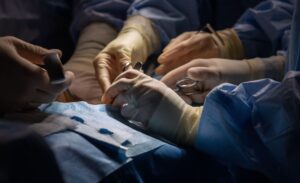Integrated Clinical Training
Washington University’s plastic surgery residents receive a robust, integrated education with a strong surgical knowledge foundation and essential plastic surgery training. Our residents train in a rich, diverse and high-volume operative environment, preparing them well for a fellowship or practice of their choosing.
While the initial years of training are crucial in building the surgical knowledge foundation, it is also important to begin plastic surgery training concurrently.
PGY1
Residents spend 1-2 months on plastic surgery and 10-11 months on general surgery rotations that provide a solid basis for surgical techniques and patient management. All clinical experience in the required ABPS Content Areas outlined below are achieved during PGY1 with General Surgery:
- Abdominal surgery
- Oncologic/Breast surgery
- Pediatric surgery
- Surgical critical care
- Surgical oncology (non-breast)
- Transplant
- Trauma management
- Vascular surgery
- Acute Burn
PGY2
Residents achieve the required ABPS Sub-Specialty Content Areas clinical training in anesthesia, orthopedic hand surgery, and oral-maxillofacial surgery, with the remainder of the year spent with plastic surgery.
PGY3
The residents’ training focuses primarily on plastic surgery during the 3rd year while learning to manage emergency room consults, develop perioperative plans, and gain surgical skills specific to the practice of plastic surgery. They also achieve clinical training in the remaining two ABPS Sub-Specialty Content Areas: oculoplastics and surgical dermatology.
PGY4-6
The final three years involve full-time plastic surgery training that includes the full range of plastic and reconstructive surgery, advanced training in microsurgery, hand surgery, peripheral nerve and brachial plexus surgery, aesthetic surgery, pediatric plastic surgery, lymphedema surgery, gender affirmation surgery, craniofacial surgery and all aspects of flap reconstruction.
Our training paradigm is an apprenticeship approach. Residents spend 1 to 4 months on each rotation. On most rotations, residents are assigned to two attending physicians with a similar focus. These include breast and body reconstruction, advanced microsurgical reconstruction, hand surgery, pediatric plastic surgery, and a rotation at an affiliated community hospital that includes training in aesthetics and cosmetic surgery.
Chief Resident Years
Residents will rotate through the cosmetic surgery clinic. Although this clinic is overseen by faculty, residents are responsible for preoperative planning, operative management and postoperative follow-up.
Resident Exams
Each year, beginning as a PGY1, residents are required to take the written ASPS Plastic Surgery In-Service Examination in March. PGY4-6 residents will participate in mock-oral examinations twice per academic year, followed by an in-depth evaluation with division faculty.



